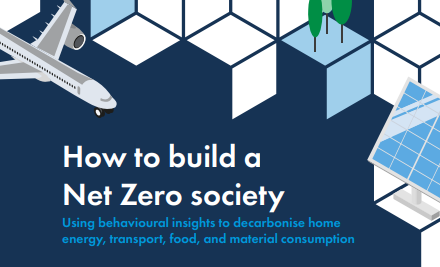To mark the World Environment Day, we’d like to tell you about our recent major sustainability event.
To achieve the UK’s net-zero targets, we need significant social and behavioural shifts. But how can we get there? To help answer this question, earlier this year, BIT released a new flagship report on ‘How can we build a Net Zero society’ bringing more than 50 behavioural solutions across the major emitting sectors of Energy, Transport, Food and Material Consumption.
In March, we also held a special launch event with some of the biggest names in behavioural climate public policy to get their take on the role of behaviour change for Net Zero. We had with us:
- Toby Park, Head of Energy and Sustainability at BIT, the lead author of the report
- Prof. Cass Sunstein (Harvard Law School), co-author of Nudge
- Prof. Lorraine Whitmarsh (Director of the Centre for Climate Change and Social Transformation at University of Bath)
- Prof. Lucia Reisch (Director of the El-Erian Institute of Behavioural Economics & Policy)
- Prof. David Halpern, BIT’s CEO
- Ravi Gurumurthy, Nesta’s CEO
Listen to the recording of the event here:
During the event, speakers explored various key topics from our report on promoting sustainable behaviour change. You can listen to it all on our podcast but here are some of the main themes that emerged:
- Barriers to promoting sustainable behaviour: The speakers highlighted barriers in critical areas such as home energy. A lack of skilled workers to install new energy systems hampers supply, while concerns about affordability and disruption impede demand. The “intention-behaviour gap,” the disparity between what people intend to do and what they actually do, was identified as a significant obstacle. Understanding the root causes of this gap is crucial for designing effective interventions.
- The importance of visible behaviours: Visibility plays a crucial role in encouraging the adoption of sustainable measures such as heat pumps and retrofits (as studies on ‘social contagion of solar panels’ show). Making green features more visible, such as using clear labels or signage on homes (or cars, as we recommended to DfT and can now see all around us) can raise awareness and promote a contagion effect. It’s essential to address the lack of awareness caused by behaviours that occur behind closed doors.
- Central hub for green action information: Given the diverse circumstances of individuals, providing personalised recommendations through a central information hub, like our prototype of GetGreener.com, would be helpful. By using publicly available data (e.g., postcode or vehicle license plate), individuals could receive tailored suggestions, including information and tips to guide their sustainable actions.
- Applying systems thinking: Taking a systems approach to behaviour change can help identify leverage points for effective interventions. Our own Upstream-Donwstream framework (see below) illustrates this well – the higher up the change, the bigger the effect. For instance, research shows that when a quarter of the population publicly advocates a behaviour, such as electric vehicle adoption or a plant-based diet, it can lead to a significant acceleration in its prevalence. While individual actions are important, systemic changes are necessary to foster an environment that supports and encourages sustainable choices.
- The role of businesses: Businesses have a significant influence on shaping consumer choices. However, profit motives may hinder their willingness to prioritise sustainability. Therefore, it is important to encourage behavioural change within businesses and explore ways to influence their operations, including engaging with suppliers and customers. BIT have worked with several businesses on nudging for good, be it Unilever or Sky, to name a few.
- The role of the financial sector: The financial sector can play a role in promoting sustainability by offering greener investment options. For example, defaulting individuals into green workplace pensions could channel significant capital toward sustainable investments (see also BIT’s thinkpiece on this).
- Governments leading by example: Government action is vital in creating an enabling environment for sustainable behaviour change. Governments can lead by example through initiatives such as retrofitting government buildings (see also our recent work on retrofitting in Ireland), electrifying public vehicle fleets, and embracing plant-based catering. In fact, 87% of UK population expect this from government. Engaging with the public, listening to their concerns, and providing clear, actionable messaging are also important for driving sustainable choices.
- Deliberative forums: Polls and data points have limitations in capturing public support for sustainable measures. Deliberative forums and citizen assemblies can provide a more accurate representation of public opinion. These platforms often generate strong recommendations and widespread support for pro-environmental measures, as was clear from the UK’s Climate Assembly.
- Sustainability goes beyond decarbonisation: Actions aimed at reducing emissions should also consider their impact on biodiversity (see our work on protecting elephants and tigers), water use, and pollution. A comprehensive approach that addresses various environmental issues is necessary for effective sustainability efforts.
Want to learn more?
- Download the full report
- Listen to our podcast on the event or a previous one, where we discussed some of the key headlines from our new report.
- Read our other reports of interest: Menu for Change (on green nudges for food), The Little Book of Green Nudges, Behaviour Change for Nature (on conservation) or Greening Pensions
- Work with us: If you are from a national or local government, international organisation or a business and would like to work with us to develop and test behavioural solutions for your green challenge, contact us directly at info@bi.team.













